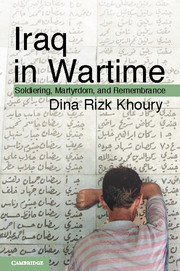Book contents
- Frontmatter
- Contents
- List of Illustrations, Maps, and Table
- Acknowledgments
- Note on Translations and Transliteration
- Maps
- 1 Introduction
- 2 Iraq’s Wars under the Ba‘th
- 3 The Internal Front
- 4 Battlefronts
- 5 Things Fall Apart
- 6 War’s Citizens, War’s Families
- 7 Memory for the Future
- 8 Commemorating the Dead
- 9 Postscript
- Appendix I Distribution in Percentage of Ba‘th Party Members, “Friends of Saddam,” and Martyrs in Fifteen Iraqi Provinces, 1998–1999
- Appendix II Percentage of Ba‘th Party Membership among Matriculating Students (Sixth Secondary) in Ten Iraqi Provinces, 1987–1988
- Appendix III Report Issued by Ali Hasan al-Majid, Head of the Northern Bureau of the Ba‘th Party to the General Secretariat, August 1987
- Sources and Bibliography
- Index
- References
5 - Things Fall Apart
Published online by Cambridge University Press: 05 March 2013
- Frontmatter
- Contents
- List of Illustrations, Maps, and Table
- Acknowledgments
- Note on Translations and Transliteration
- Maps
- 1 Introduction
- 2 Iraq’s Wars under the Ba‘th
- 3 The Internal Front
- 4 Battlefronts
- 5 Things Fall Apart
- 6 War’s Citizens, War’s Families
- 7 Memory for the Future
- 8 Commemorating the Dead
- 9 Postscript
- Appendix I Distribution in Percentage of Ba‘th Party Members, “Friends of Saddam,” and Martyrs in Fifteen Iraqi Provinces, 1998–1999
- Appendix II Percentage of Ba‘th Party Membership among Matriculating Students (Sixth Secondary) in Ten Iraqi Provinces, 1987–1988
- Appendix III Report Issued by Ali Hasan al-Majid, Head of the Northern Bureau of the Ba‘th Party to the General Secretariat, August 1987
- Sources and Bibliography
- Index
- References
Summary
Two days before the beginning of the air war against Iraq, Waddah Hasan’s editor at the al-Qadissiyya newspaper summoned him to a press conference. The meeting was meant to be a joint briefing by Saddam Hussain and UN Secretary General Perez de Cuellar on a last-ditch effort to avert war with the U.S.-led coalition that Waddah, like many Iraqis, viewed as suicidal for both the regime and Iraq. When Saddam Hussain entered the room without de Cuellar, Waddah and his colleagues were filled with foreboding. Hussain said that the attempts at reaching an agreement had failed, reassured those at the meeting of the strength and preparedness of the Iraqi armed forces, took questions from the journalists, and departed. The version later shown on Iraqi television omitted, according to Waddah, the moment when Hussain told journalists, “Live and die over Kuwait.”
Of the many hyperbolic statements Saddam Hussain made in his career, this one was closest to the truth. The war, the ensuing uprising, and the UN-imposed sanctions did not destroy the regime, but they did deplete state institutions, weaken and transform the Ba‘th Party, and, perhaps most important, decimate the fabric of Iraqi society. To mobilize the population between the invasion and occupation of Kuwait on August 2 and the beginning of the air war on January 17, the regime and the party drew on the repertoire of techniques they had developed during the Iran-Iraq war. Their success was limited. The party could not justify the war as a defensive one, nor could it muster the resources to plan for what all, including the regime, saw as a struggle between the life and death of the politics of Ba‘thist Iraq. Internally, the regime and the party were in disarray. The Ba‘th Party, so adept at managing the social costs of the earlier war, could do little in the face of the pummeling of civilian infrastructure experienced in cities like Baghdad and Basra. The ground war and the chaotic and deadly withdrawal of the Iraqi army fueled the massive uprising that followed.
- Type
- Chapter
- Information
- Iraq in WartimeSoldiering, Martyrdom, and Remembrance, pp. 123 - 160Publisher: Cambridge University PressPrint publication year: 2013

